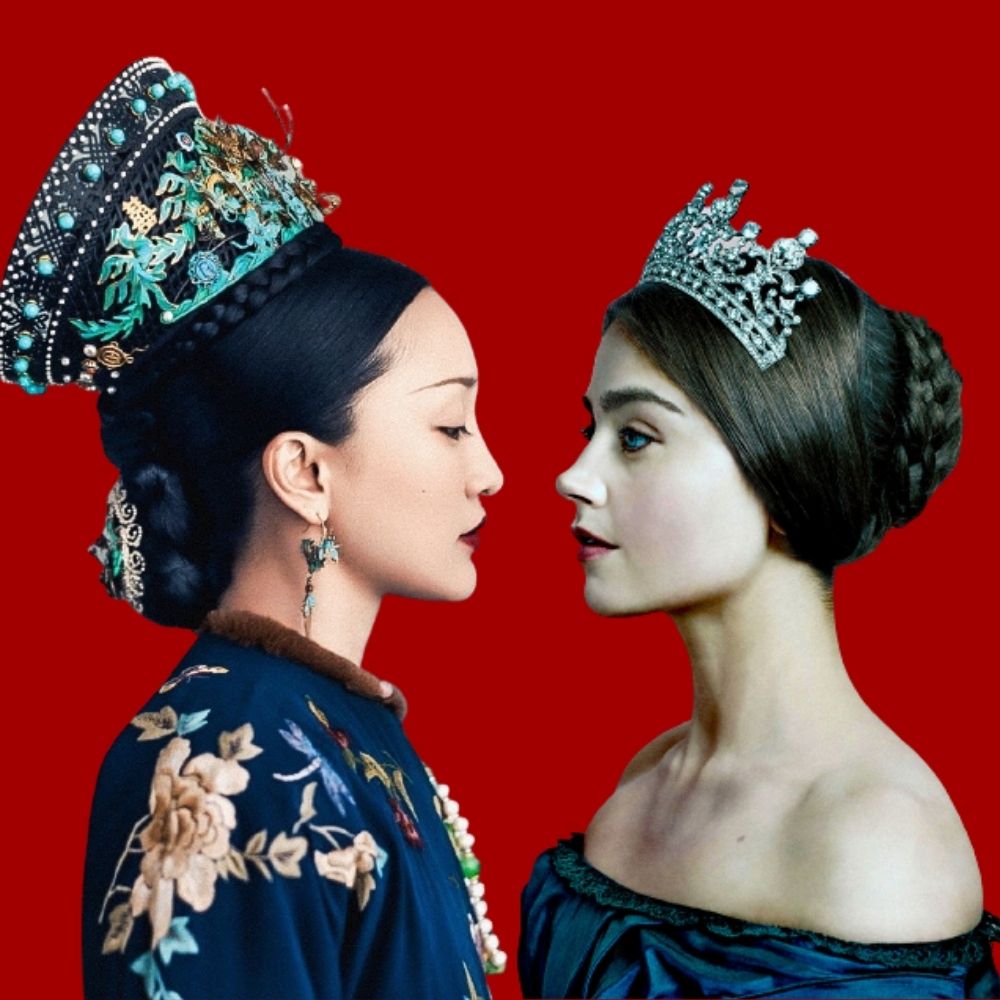Few know much about the greatest historical drama of the last two hundred years. Then, there was a time two Empresses ruled the world. Born a year apart, both died at the turn of the twentieth century. These two women ruled over more than half the world’s people for more than fifty years. At the end of their lives, their two empires were soon gone, brought down by their own hands.
The two women could not have been more different, either in their achievements or outlook, irrespective of their ethnicity. Yet it’s Alexandrina Victoria von Wettin, née Hanover, better known as Queen Victoria, Empress of India, we know best. Most of us learned at school how under her rule the British Empire became the most powerful force on Earth and was one upon which the sun never set. Westerners also remember Queen Victoria fondly through what is called “The Victorian Age” resplendent with its literary, military, and industrial achievements, as well as Queen Victoria’s story-book love affair with Albert. Or with John Brown for the more lascivious of her biographers. The other, the magnificent Dowager Empress Cixi Yehonala, a woman of far greater ability and influence, languishes in poorly told history books and some awful blockbuster movies like 55 Days in Peking. For historical drama, they don’t come much better than this.
Dowager Empress Cixi Yehonala’s story is one historians are now beginning to tell more accurately. And we shall all be the better for the re-telling of the life of one of history’s most awe-inspiring women.
Although the time two Empresses ruled the world and controlled vast empires, neither of the two empresses understood much of the world beyond their shores. A failure which proved the undoing of them both.
Victoria, metaphorically and literally, was a product of Victorian times and gender prescribed roles were always under the influence of powerful male forces. Her husband, Albert, for example, was her moral adviser, and a man she relied on too heavily. And also on people like Palmerston, Disraeli, Melbourne, and others who ran the Empire while she became merely the figurehead. Her accomplishments were few, some far from noteworthy, once earning her the title of The Famine Queen. A prize for mostly ignoring the deaths of one million Irish during the potato famine, her disinterest gave rise to Sinn Fein and the IRA. For the last forty years of her reign, after Albert died, Victoria was almost a black-clad reclusive. Victoria never supported rights for women and advised against such things. In addition, her childish enthusiasm when she received Hong Kong as reparations after conflicts with China, was an example of her naïveté in foreign affairs. In a quirk of history, her government’s Opium Wars and gunboat diplomacy were eventually responsible for bringing down the Dowager Empress Cixi Yehonala’s Qing Dynasty. More in a later blog…
Unsatisfied with disembowelling the Qing Dynasty, Victoria set about manufacturing the end of the British Empire. Her interest in seeding the royal families of Europe by marrying off her daughters to its tsars, princes, and emperors created a couple of grandchildren who brought down the Prussian Hohenzollern and Romanov Empires. And, ultimately, her own. For example, the first grandson, Kaiser Wilhelm II, kicked off World War 1. Then the second, Tsar Nicholas II, ushered in the Bolshevik Revolution and got them all shot in Yekaterinburg. The Victorian Age certainly did leave a lasting impression on the world as the sun finally began to set on the British Empire.
But what of Dowager Empress Cixi Yehonala? Well, she was almost everything Queen Victoria wasn’t. Cixi Yehonala ruled with intelligence, tireless strength, and often ruthlessness in the brutal politics of the time. Rising from sexual servitude as a sixteen-year-old concubine, she played a leading role in creating the foundations for modern China, then emerging from feudalism into its later place as a republic. She fought and prevailed against almost insurmountable obstacles from inside, ultimately failing against those ranging against her from outside China.
Unlike Victoria, Cixi was a feminist. She drove policies for the education of women by urging officials to fund schools for girls, and by a decree made it official that women must be educated. She set up her own school, as well as an institute of higher education for women. These efforts led to China’s first female students being awarded scholarships to go abroad. Among recipients of these scholarships were three of the most famous Chinese women of the twentieth century: the Soong sisters, Mei-ling, Ching-ling, and Ai-ling.
The three sisters married the most important historical figures in the early days of the Chinese Republic: Sun Yat-sen, Chiang Kai-shek, and H.H. Kung, the richest man in China and a descendant of Confucius. These were three other amazing Chinese women who changed the world. They were the focal point of every major decision made in modern Chinese history, up to and beyond the creation of Mao’s China.
I’ll say more about Dowager Empress Cixi Yehonala’s legacies in my next blog. But little wonder when I was looking for modern heroes for my books, I needed to look no further than inventing descendants of Cixi. An easier choice than modelling the vacuousness of the current crop of Queen Victoria’s descendants.
With their many flaws – I didn’t want to bring two Boadicea’s back into vogue – Kata and Clara Yehonala are set to change their world as they right the wrongs of our inhumanity to others less fortunate. Theirs may not be a historical drama, but their adventures most certainly are dramatic.
Buy your copy of this extraordinary novel by visiting Shawline Publishing HERE
Robert Barclay
Robert Barclay is an Australian author of some of the best Australian crime/mystery novels. His Australian romance novels and stories follow the lives of Katy Yehonala and her daughter, Clara, his strong female protagonists as they confront the evils of society.
